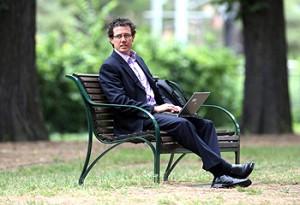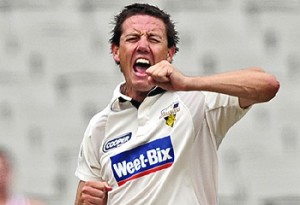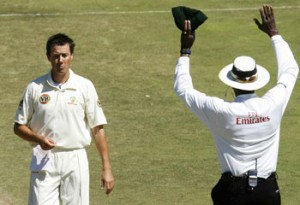
A gradual but inevitable descent into cricket-based loathing and bile.
Whatever Happened To The Unlikely Lads (International Edition)? #21: Bryce McGain
Sometimes you just want to leave the darker moments in your nation’s past behind. Forget about them. Like they never happened. It’s the wrong approach of course. Unfair on those who were unfortunate enough to live through those dark times. Unfair to forget their suffering, and let the lessons they so painfully learned be lost. So we hope our readers understand that it gives us no pleasure to relive perhaps the darkest moment in recent Australian cricketing history, and that those who experienced it firsthand will forgive us for the anguish the following article will no doubt cause. We refer, of course, to the day that Australia handed a baggy green to one
#21: Bryce Edward McGain
There has been a tendency in recent years for the Australian selectors to try to look into fields afar for the next Shane Warne. Disenchanted with the filth merchants stinking up domestic cricket, they seem to think instead that their prayers will be answered amongst the legions of Sunday league cricketers plying their trade throughout the land. Ashes hero Michael Beer made his debut after only five first class appearances. Nathan Lyon was more recognizable as a groundskeeper at Adelaide Oval than a first class cricketer when he was handed his first baggy green. And Nathan Hauritz was playing club cricket in Sydney when he was recalled to the Test team in 2008.
In a way this policy is heartening, in that it suggests that even in this professional age of sport, even your everyday slob still has a chance of making good on his dreams of playing Test cricket. It reinforces the idea, also, that cricket is still a thinking man’s game. Where physical prowess still runs a distant second to intellectual nous. Perhaps the selectors hoped to avoid selecting spinners whose attacking instincts had been blunted by years of brutal exposure to domestic batting line-ups. In a way this policy showed a modicum of sense. Those spinners above were selected on the basis of recommendations of past spinners rather than their domestic records. It harked back to the days when Terry Jenner discovered Shane Warne, when he was an otherwise non-descript tubby leggie plying his trade in Melbourne club cricket. Which is interesting, because it was the same man who ‘found’ Bryce McGain.
At the risk of sounding overly myopic, there has been nothing essentially wrong with the succession of spin bowlers who have attempted to succeed Shane Warne’s mantle as Australia’s number one (except for Cameron White of course; there is plenty wrong with him). It wasn’t really their fault that they failed, and they are all otherwise probably fine proponents of spin bowling. It’s just that they weren’t good enough for international cricket. Either they had been picked before their time, didn’t receive the proper conditioning, or simply weren’t up to the challenge. Whatever the case it’s hardly their fault they were thrown to the lions. Instead it was the selectors’ fault for picking them in the first place, only to stand aside and watch as they were destroyed in the most public manner possible, before callously dispensing with their services afterwards. It almost makes you feel sorry for Xavier Doherty. Almost.
Of course the greatest example of this policy can be found in the short lived career of Bryce McGain. A bank worker who also played a bit of cricket on side for Prahran in Melbourne club cricket, McGain was thrust into the limelight after one average season in the Victorian domestic squad. Initially earmarked to make his debut in the 2008 tour of India, a shoulder injury forced his withdrawal, leading to the debut of another of Australia’s recent spinning greats. McGain’s reprieve did not last long, however, and in March of 2009 he was selected to play against South Africa at Newlands, at the spritely age of 36.

McGain was always a popular figure in the dressing room, owing to the excellent tax returns he provided.
He was introduced into the attack just before the end of the first day, when South Africa’s first innings was barely 13 overs old, after Australia had been dismissed for 209 (McGain picking up two runs). His second delivery was deposited over the long on boundary by Ashwell Prince, but he was otherwise treated with a certain amount of respect. The next day, however, all hell broke loose. Kept out of the attack till after lunch, when the South Africans were already nearing 200 for the loss of only two wickets, Prince and Jacques Kallis took him apart. There was a distinct impression that Ricky Ponting had been trying to hide his debutant as much as he could, but in the end simply stood aside and watched as he was clattered to all parts. There were rumors at the time that Ponting had fallen out with the selectors over the make-up of his team, and after this display it was noticeable he was given a far greater degree of control over selections, in particular of spinners, which inaugurated the period of Australia primarily fielding defensive spinners that suited Ponting’s philosophy of containment.
Whatever the case, McGain was taken to the cleaners, conceding 149 runs off 18 overs, with no wickets to speak of. In the end Australia lost the match by an innings and 20 runs, and although they won the series 2-1, McGain was sensibly enough never to be seen in national team colors again. On the tour of England later that year it was Nathan Hauritz who was required to act as Australia’s front line spinner, a task he surprised everyone by fulfilling somewhat competently. McGain returned to domestic cricket, where his appearances were largely limited to T20 encounters. He is still plying his trade in grade cricket, and can occasionally be found in the ABC commentary box, but his career effectively ended that day at Newlands.
It’s hard to know whether to feel sorry for McGain or not. Clearly he was poorly treated by the selectors, and arguably by his captain at the time as well, but on the other hand he can undoubtedly think himself lucky he got to play Test cricket at all. At the end of the day, even if his name is a byword for comic ineptness, he still has a baggy green in the cupboard to be proud of. Which gives a skerrick of hope to the rest of us really.



No Comments
Post a Comment